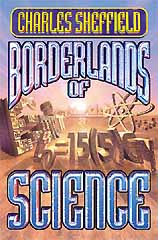
You are reading an out-of-date book. Since the frontiers of science constantly advance, today's discussion of the borderlands of science will be obsolete tomorrow.
Unfortunately, I can't tell you which parts of the book that you are holding need an immediate update. With luck, the short-term changes will be mostly in the details, and the roots of each subject covered will survive intact. The biggest changes in science usually turn out to be the most surprising, the least predicted, and the slowest to be accepted.
Around the year 1900 there were plenty of forecasts as to what the coming century might bring. They were all wrong, not because of what they included, but because of what they left out. On the abstract side, no one expected relativity, quantum theory, the expansion of the universe, holography, subatomic structure, the conversion of matter to energy, solid state physics devices (such as transistors), information theory, black holes, the molecular structure of DNA, retroviruses, genome mapping, and the theory of finite state automata. Still less did anyone expect the torrent of practical applications, with their massive social fallout, that would follow from the new theories: television and telephones in almost every home, personal computers, supersonic aircraft, humans to the Moon and observing equipment to the planets, lasers, genetic engineering, video recorders, antibiotics, CAT scans, nuclear energy plants and nuclear bombs, and artificial satellites in regular use for communications, weather, and monitoring of the Earth's surface. No one in 1900 imagined that by 2000 the automobile would be absolutely central to many people's lives, as the principal means of transportation, recreation, and even courtship. Even in 1950, not a person on the planet would have predicted the existence of hundreds of millions of computers, used daily to conduct business, play games, send and receive mail, and wander at will through a world-wide information network.
Given our track record, and the fact that changes seem to be ever faster and more confusing, a pessimist could conclude that it is now impossible to write science fiction. Prediction of future conditions is impossible; even if we get the science right, surely the consequent social changes will be nothing like we suppose or can suppose. When reality is so surprising, what place is there for imagined worlds?
I prefer to argue as an optimist. In science fiction, new science and new applications mean an endless supply of new story ideas. So long as science and technology continue to advance, we can never run out of subject matter.
This book should be regarded as a beginning, not an end. It defines the frontiers—"borderlands"—of today's science. Those frontiers are not fixed, but constantly expanding. As they expand, the territory just beyond them comes into view. In that territory, waiting to be picked up and used, lie hundreds and thousands of gorgeous story ideas. They are pristine ideas, never used before, because they sit on ground never before explored.
I invite you to join me in wandering the new territories, picking up the best ideas, and using them. My idea is to offer a starting place for the exploration, but certainly not an end point. For one thing this book, like any book ever written, reflects the author's personal interests and obsessions. It's not reasonable that your own favorite scenery will exactly match mine.
A couple of final points need to be made. The first is an answer to the natural question: Why, with the Internet an integral part of most people's lives, do I not direct the reader to web sites for information? One answer will be obvious to you if you happen to be reading this book at the beach, or, as I like to think, secretly in a classroom while a teacher spouts New Age non-science at you. A book provides easy access, unobtrusively and with no need of special equipment.
Second, if you want to talk about lack of quality control there is no better example than the Internet. Normally, if it comes from somewhere like the Jet Propulsion Lab or the National Institutes of Health, it should be reliable. But even that is not safe. Some names of well-known individuals and institutions have been pre-empted as web site names. You think you are reading a report from the famous Dr. X. What you don't know is that Dr. X. is at this very moment engaged in a lawsuit regarding the theft of his good name and reputation.
One more caveat. This book makes another assumption. As a friend of mine, Roger Allen, said to me, "You call it science fiction, whereas most people pronounce it as science fiction." I plead guilty. That is indeed the way I view the science fiction field, or at least the part of the field that interests me. I assume that you, the reader, are interested in reading (and possibly writing) science fiction stories with some reasonable emphasis on science. If not, then this is not the book for you.